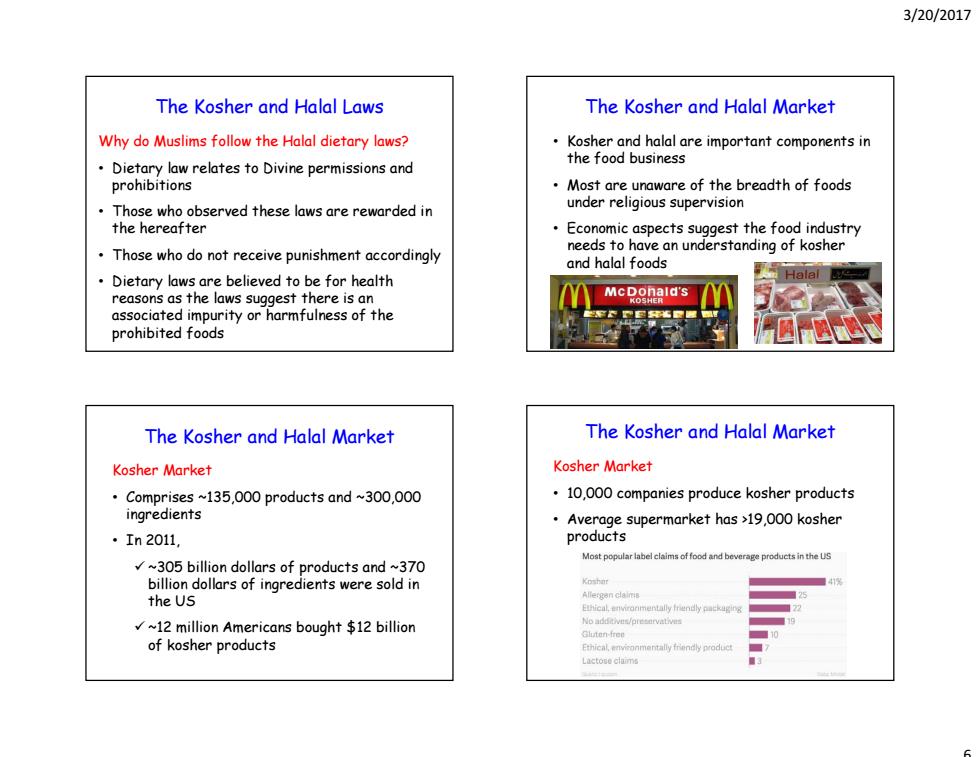
3/20/2017 The Kosher and Halal Laws The Kosher and Halal Market Why do Muslims follow the Halal dietary laws? Kosher and halal are important components in the food business Dietary law relates to Divine permissions and prohibitions Most are unaware of the breadth of foods Those who observed these laws are rewarded in under religious supervision the hereafter Economic aspects suggest the food industry Those who do not receive punishment accordingly needs to have an understanding of kosher and halal foods Dietary laws are believed to be for health reasons as the laws suggest there is an McDonald's associated impurity or harmfulness of the prohibited foods The Kosher and Halal Market The Kosher and Halal Market Kosher Market Kosher Market Comprises ~135,000 products and ~300,000 .10,000 companies produce kosher products ingredients Average supermarket has >19,000 kosher ·In2011, products ~305 billion dollars of products and ~370 Most popular label claims offood and beverage products in the US billion dollars of ingredients were sold in Koshar the US Allergen claing Ethical,enwranmentlly fnundly pac ~12 million Americans bought $12 billion of kosher products Lactose claims
3/20/2017 6 The Kosher and Halal Laws Why do Muslims follow the Halal dietary laws? • Dietary law relates to Divine permissions and prohibitions • Those who observed these laws are rewarded in the hereafter • Those who do not receive punishment accordingly • Dietary laws are believed to be for health reasons as the laws suggest there is an associated impurity or harmfulness of the prohibited foods The Kosher and Halal Market • Kosher and halal are important components in the food business • Most are unaware of the breadth of foods under religious supervision • Economic aspects suggest the food industry needs to have an understanding of kosher and halal foods The Kosher and Halal Market Kosher Market • Comprises ~135,000 products and ~300,000 ingredients • In 2011, ~305 billion dollars of products and ~370 billion dollars of ingredients were sold in the US ~12 million Americans bought $12 billion of kosher products The Kosher and Halal Market Kosher Market • 10,000 companies produce kosher products • Average supermarket has >19,000 kosher products
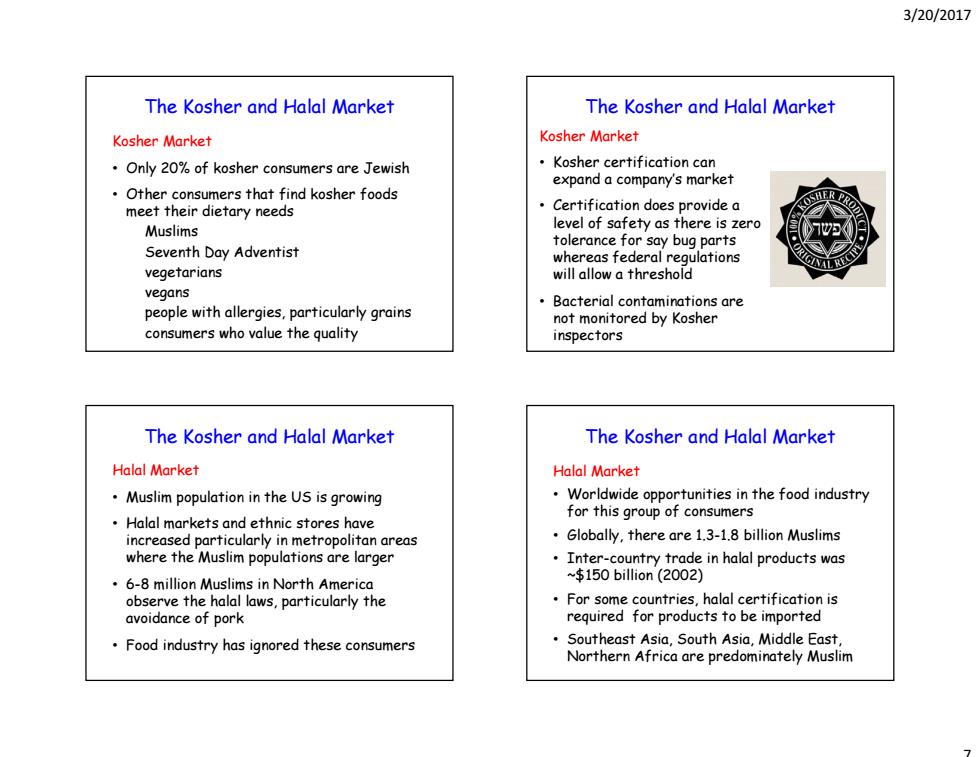
3/20/2017 The Kosher and Halal Market The Kosher and Halal Market Kosher Market Kosher Market Only 20%of kosher consumers are Jewish Kosher certification can expand a company's market Other consumers that find kosher foods meet their dietary needs Certification does provide a Muslims level of safety as there is zero folerance for say bug parts Seventh Day Adventist whereas federal regulations vegetarians will allow a threshold vegans Bacterial contaminations are people with allergies,particularly grains not monitored by Kosher consumers who value the quality inspectors The Kosher and Halal Market The Kosher and Halal Market Halal Market Halal Market Muslim population in the US is growing Worldwide opportunities in the food industry for this group of consumers Halal markets and ethnic stores have increased particularly in metropolitan areas Globally,there are 1.3-1.8 billion Muslims where the Muslim populations are larger Inter-country trade in halal products was ~$150 billion(2002) 6-8 million Muslims in North America observe the halal laws,particularly the For some countries,halal certification is avoidance of pork required for products to be imported Food industry has ignored these consumers Southeast Asia,South Asia,Middle East, Northern Africa are predominately Muslim
3/20/2017 7 The Kosher and Halal Market Kosher Market • Only 20% of kosher consumers are Jewish • Other consumers that find kosher foods meet their dietary needs Muslims Seventh Day Adventist vegetarians vegans people with allergies, particularly grains consumers who value the quality The Kosher and Halal Market Kosher Market • Kosher certification can expand a company’s market • Certification does provide a level of safety as there is zero tolerance for say bug parts whereas federal regulations will allow a threshold • Bacterial contaminations are not monitored by Kosher inspectors The Kosher and Halal Market Halal Market • Muslim population in the US is growing • Halal markets and ethnic stores have increased particularly in metropolitan areas where the Muslim populations are larger • 6-8 million Muslims in North America observe the halal laws, particularly the avoidance of pork • Food industry has ignored these consumers The Kosher and Halal Market Halal Market • Worldwide opportunities in the food industry for this group of consumers • Globally, there are 1.3-1.8 billion Muslims • Inter-country trade in halal products was ~$150 billion (2002) • For some countries, halal certification is required for products to be imported • Southeast Asia, South Asia, Middle East, Northern Africa are predominately Muslim
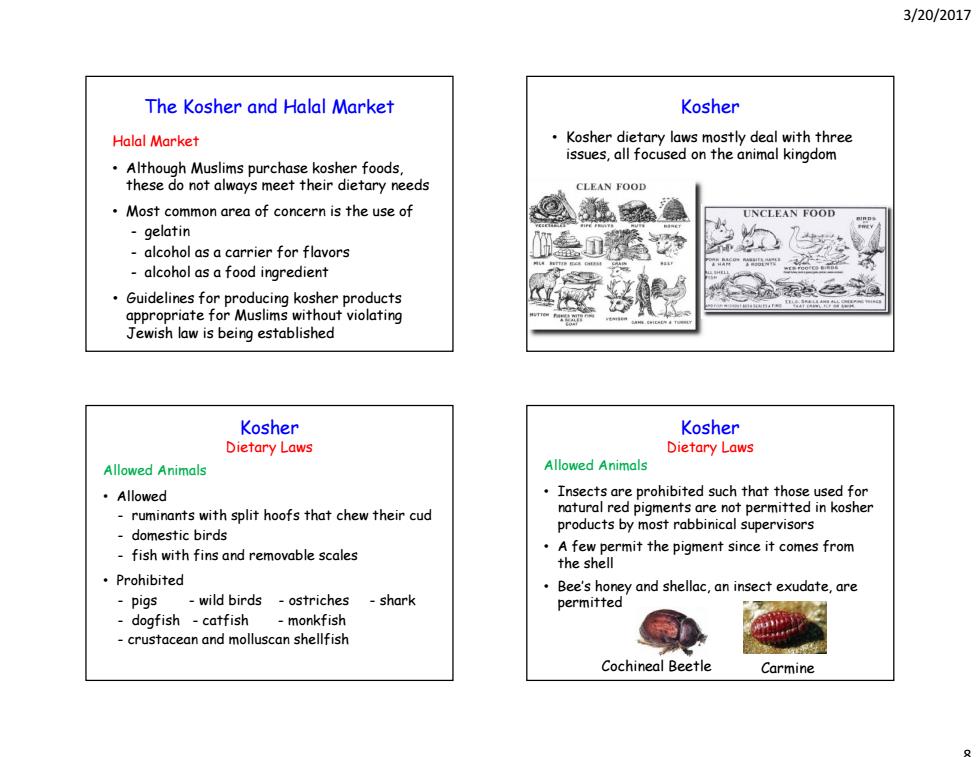
3/20/2017 The Kosher and Halal Market Kosher Halal Market Kosher dietary laws mostly deal with three issues,all focused on the animal kingdom Although Muslims purchase kosher foods, these do not always meet their dietary needs CLEAN FOOD Most common area of concern is the use of UNCLEAN FOOD 、gelatin alcohol as a carrier for flavors 套 alcohol as a food ingredient Guidelines for producing kosher products 多 appropriate for Muslims without violating Jewish law is being established Kosher Kosher Dietary Laws Dietary Laws Allowed Animals Allowed Animals ·Allowed Insects are prohibited such that those used for ruminants with split hoofs that chew their cud natural red pigments are not permitted in kosher products by most rabbinical supervisors -domestic birds fish with fins and removable scales A few permit the pigment since it comes from the shell ·Prohibited Bee's honey and shellac,an insect exudate,are -pigs -wild birds -ostriches -shark permitted dogfish -catfish -monkfish -crustacean and molluscan shellfish Cochineal Beetle Carmine
3/20/2017 8 The Kosher and Halal Market Halal Market • Although Muslims purchase kosher foods, these do not always meet their dietary needs • Most common area of concern is the use of - gelatin - alcohol as a carrier for flavors - alcohol as a food ingredient • Guidelines for producing kosher products appropriate for Muslims without violating Jewish law is being established Kosher • Kosher dietary laws mostly deal with three issues, all focused on the animal kingdom Kosher Dietary Laws Allowed Animals • Allowed - ruminants with split hoofs that chew their cud - domestic birds - fish with fins and removable scales • Prohibited - pigs - wild birds - ostriches - shark - dogfish - catfish - monkfish - crustacean and molluscan shellfish Kosher Dietary Laws Allowed Animals • Insects are prohibited such that those used for natural red pigments are not permitted in kosher products by most rabbinical supervisors • A few permit the pigment since it comes from the shell • Bee’s honey and shellac, an insect exudate, are permitted Cochineal Beetle Carmine
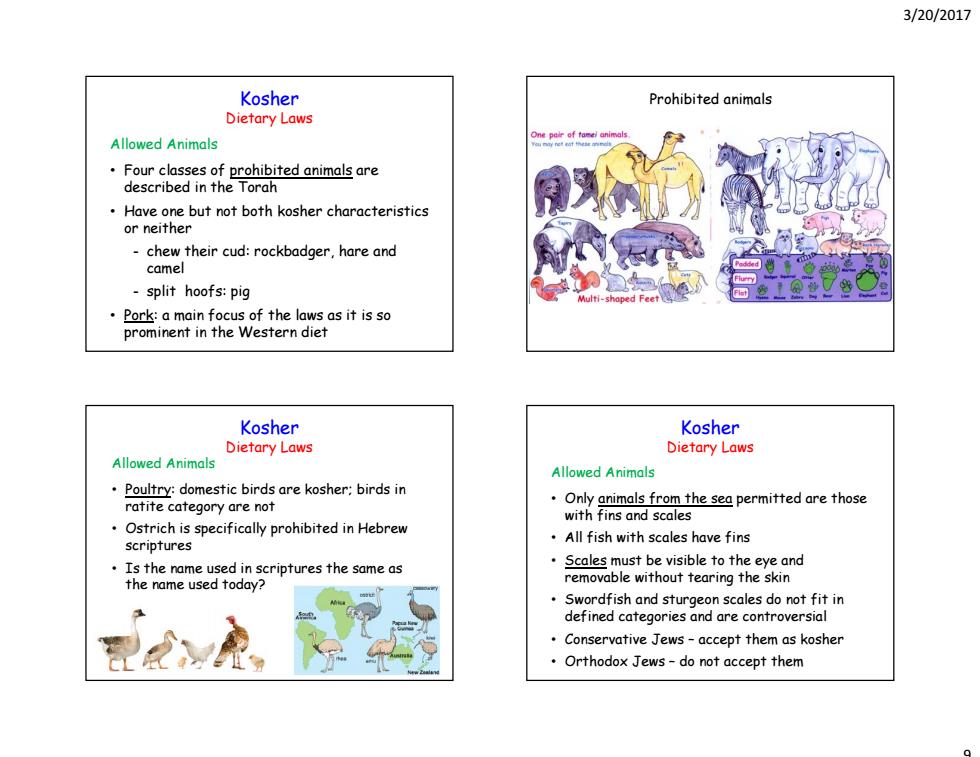
3/20/2017 Kosher Prohibited animals Dietary Laws Allowed Animals Four classes of prohibited animals are described in the Torah Have one but not both kosher characteristics or neither chew their cud:rockbadger,hare and camel split hoofs:pig Pork:a main focus of the laws as it is so prominent in the Western diet Kosher Kosher Dietary Laws Dietary Laws Allowed Animals Allowed Animals Poultry:domestic birds are kosher:birds in ratite category are not Only animals from the sea permitted are those with fins and scales Ostrich is specifically prohibited in Hebrew scriptures All fish with scales have fins Is the name used in scriptures the same as Scales must be visible to the eye and the name used today? removable without tearing the skin Swordfish and sturgeon scales do not fit in defined categories and are controversia Conservative Jews-accept them as kosher Orthodox Jews-do not accept them
3/20/2017 9 Kosher Dietary Laws Allowed Animals • Four classes of prohibited animals are described in the Torah • Have one but not both kosher characteristics or neither - chew their cud: rockbadger, hare and camel - split hoofs: pig • Pork: a main focus of the laws as it is so prominent in the Western diet Prohibited animals Kosher Dietary Laws Allowed Animals • Poultry: domestic birds are kosher; birds in ratite category are not • Ostrich is specifically prohibited in Hebrew scriptures • Is the name used in scriptures the same as the name used today? Kosher Dietary Laws Allowed Animals • Only animals from the sea permitted are those with fins and scales • All fish with scales have fins • Scales must be visible to the eye and removable without tearing the skin • Swordfish and sturgeon scales do not fit in defined categories and are controversial • Conservative Jews – accept them as kosher • Orthodox Jews – do not accept them
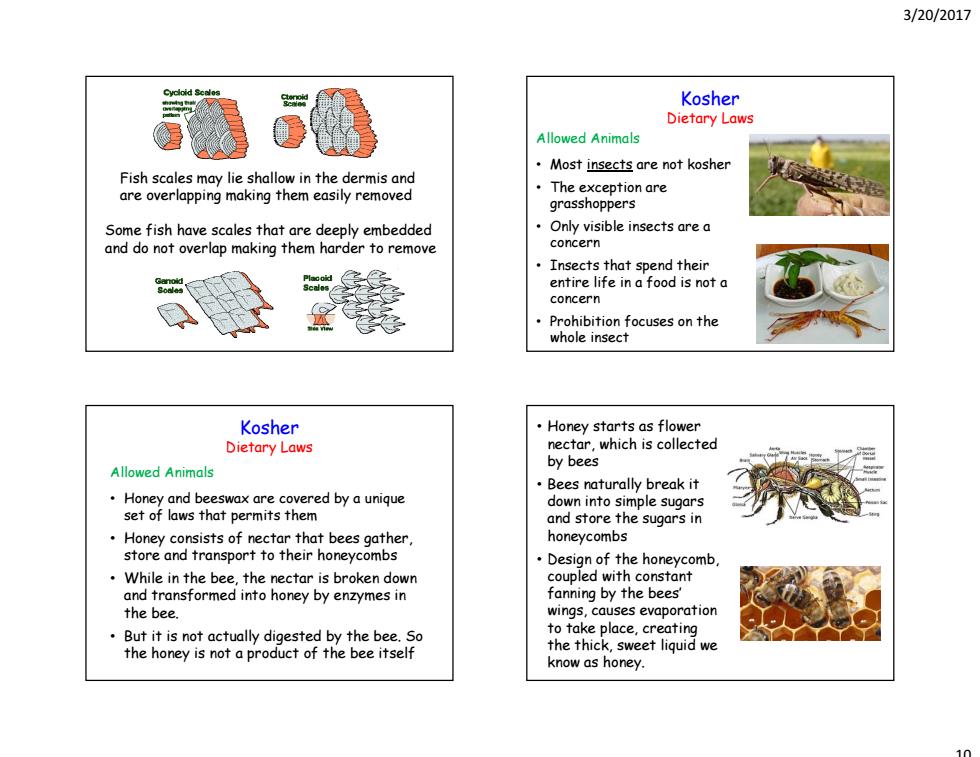
3/20/2017 9 Kosher Dietary Laws Allowed Animals Most insects are not kosher Fish scales may lie shallow in the dermis and are overlapping making them easily removed ·The exception are grasshoppers Some fish have scales that are deeply embedded Only visible insects are a and do not overlap making them harder to remove concern Insects that spend their entire life in a food is not a concern Prohibition focuses on the whole insect Kosher Honey starts as flower Dietary Laws nectar,which is collected by bees Allowed Animals Bees naturally break it Honey and beeswax are covered by a unique down into simple sugars set of laws that permits them and store the sugars in Honey consists of nectar that bees gather honeycombs store and transport to their honeycombs Design of the honeycomb, While in the bee,the nectar is broken down coupled with constant and transformed into honey by enzymes in fanning by the bees' the bee. wings,causes evaporatior But it is not actually digested by the bee.So to take place,creating the honey is not a product of the bee itself the thick,sweet liquid we know as honey
3/20/2017 10 Fish scales may lie shallow in the dermis and are overlapping making them easily removed Some fish have scales that are deeply embedded and do not overlap making them harder to remove Kosher Dietary Laws Allowed Animals • Most insects are not kosher • The exception are grasshoppers • Only visible insects are a concern • Insects that spend their entire life in a food is not a concern • Prohibition focuses on the whole insect Kosher Dietary Laws Allowed Animals • Honey and beeswax are covered by a unique set of laws that permits them • Honey consists of nectar that bees gather, store and transport to their honeycombs • While in the bee, the nectar is broken down and transformed into honey by enzymes in the bee. • But it is not actually digested by the bee. So the honey is not a product of the bee itself • Honey starts as flower nectar, which is collected by bees • Bees naturally break it down into simple sugars and store the sugars in honeycombs • Design of the honeycomb, coupled with constant fanning by the bees’ wings, causes evaporation to take place, creating the thick, sweet liquid we know as honey